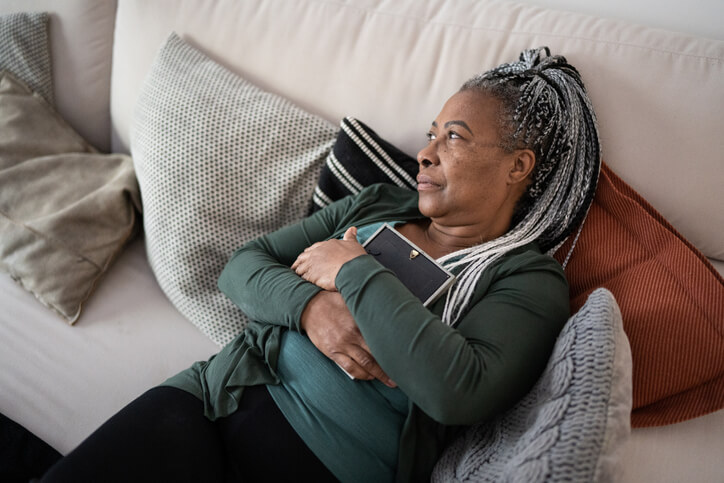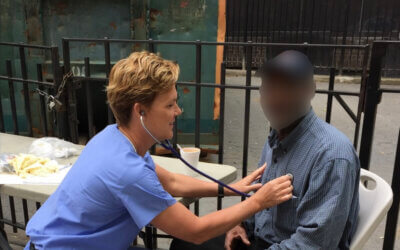Recognizing Spiritual Distress: What Caregivers Need to Know
A spiritual care coordinator, chaplain and bereavement specialist with Chapters Health System share ways for families and patients to address spiritual distress in a loved one.

Your body is very good at telling you when something is wrong. Pain, discomfort, hunger and thirst are just some of the signals our brain processes, telling us our physical body is experiencing stress. Did you know your spirit also sends signals when it’s stressed? Recognizing spiritual distress is important. It can manifest itself in many ways, both physical and emotional. The causes and symptoms can vary from person to person, making it difficult to recognize. A team of professionals, including bereavement specialists and chaplains with Good Shepherd Hospice and Chapters Health Hospice, explain their experiences so caregivers and families know what to look for with their loved ones
Defining Spiritual Distress
Recognizing spiritual distress isn’t always easy, but according to the Hospice and Palliative Nurses Association, spiritual distress is defined as a disruption in a person’s belief or value system.

“One of the founders of modern hospice, Dame Cicely Saunders, shared something I will never forget,” said Charles Harkala, spiritual care coordinator and preceptor for Good Shepherd Hospice. “We are not physical beings having a spiritual experience, but we are spiritual beings having a physical experience.”
Physical experience is life. When physical experience is challenged, our spiritual selves are also challenged. In the hospice space, a life-altering illness, death of a close loved one, and financial hardship related to care are some of the challenges pervading our public lives and strike at our spiritual core.
“People experience spiritual distress when they have a disruption in the life principle pervading their entire being,” said Suzy Soliday, licensed mental health counselor and bereavement specialist with Good Shepherd Hospice. “Those long held beliefs and non-negotiable principles are challenged, often by circumstances out of our control.”
As a result of those circumstances, a person may question the sources they once turned to for comfort, love, faith and hope.
The Signs of Spiritual Distress
“Warning signs of spiritual distress are often hidden inside of physical and emotional symptoms,” said Harkala.
The warning signs:
- Sadness, anger, despair, anxiety
- Questioning people and institutions, such as clergy, practitioners, helping entities.
- Continuously questioning the meaning of their suffering.
- Asking “Why now?” and “Why me?”
- Expressing a feeling of emptiness, loss of direction, abandonment.
These are the signs that something is missing. Something medicine cannot cure. Recognizing the signs and reporting them to a licensed mental health counselor or spiritual care specialist is the first step.
Professional Ways to Address Spiritual Distress
There are many ways to address spiritual distress, in both hospice patients and their loved ones. At Chapters Health System, a dedicated team of professionals, including physicians, nurses, bereavement specialists, social workers, chaplains and volunteers, would be available to help find the best course of treatment. Common choices include but are not limited to:
1. Pet Therapy
A recent study from the University of Toledo shows service animals and emotional support animals can provide quantifiable mental health benefits. The study is the first of its kind with peer-reviewed, published scientific evidence.
One such animal, “Elvis” the Basset Hound, helps hospice patients and their families throughout the Florida Keys with his handler, Kerry Foote, who works as a chaplain with Chapters Health Hospice.

“Spiritually, he lifts people’s hearts,” said Foote. “I wasn’t prepared by how much bringing a dog in would make a difference. I was shocked.”
Pet therapy is available to patients and families throughout Chapters Health System’s network of community-based affiliates.
2. Bereavement Support
“A bereavement approach would be to provide encouragement and validation of feelings,” said Soliday. “The client, whether it’s a patient or their family member, would be encouraged to openly express their feelings and concerns. They would be further encouraged to explore ways to cope in their own life such as journaling or physical outlets like walking and sports.”
Many hospice care providers can assist families and caregivers with bereavement. At Chapters Health System, bereavement services are free of charge and include a range of support options for both adults and children. The options include individual and group therapy sessions, including weekend grief camps for children.
3. Spiritual Support
This level of support would include a chaplain, who works in conjunction with the rest of the hospice care team available to patients and families. A chaplain is a certified clergy member who provides spiritual care for individuals in a non-religious organization, rather than a church congregation. It’s important to remember, chaplains do not necessarily belong to any religious denomination. They do not preach sermons and do not attempt to convert patients to any religious denomination.
“I am a Christian personally, but I also have knowledge in Buddhism, Hinduism, Islam and Judaism,” said Foote. “I am also an adjunct professor at Florida Keys Community College, where I teach religious studies. I believe there are three questions in life, that all humanity tries to answer. Where do I come from? Why am I here? And where am I going? All religion deals with those three questions. I try to stick within those three questions and try to meet you where you’re at.”
The role of a chaplain is to simply provide any spiritual support a patient or family requires.
“For me, it’s essential to focus on building a relationship through active listening, dialogue and openness,” added Harkala. “You must have patience, positive attitudes and empathy. Then, when they are ready, share sources leading back to faith, hope, love, meaning and assurance.”
Advice for Family
The assistance of chaplains, bereavement specialists and emotional support animals can go a long way to helping someone with spiritual distress. But what happens when those resources are not present? How can families comfort their hospice patient when the care team is not present?
- Provide a calm, relaxing setting
- Treat the person with dignity and respect
- Be present
- Listen
- Spend quality time and look for ways to make positive memories
- If asked, be open to contacting a spiritual leader of their choosing.
“Acceptance, love, compassion and sharing hope in its many forms are great tools for battling and ultimately defeating spiritual distress,” said Harkala.
Chapters Health System has a variety and services and support for patients. As always, Chapters Health is committed to serving their needs as well as the needs of our families, caregivers, health providers, partners, and communities.
For more information, please call our helpful Chapters Health and HospiceHelp24® team at 1.866.204.8611 or Contact Us.
Keep Exploring
















